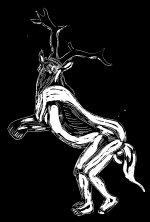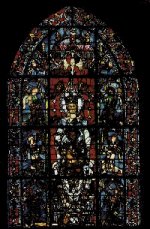
B.C. on Religion: My Views on Religion
A Meta-Discussion About Religion
As a pseudo-scientific, rational, and technically trained individual, I often have to explain why I'd even bother considering religion. There seems to be a belief that religion is not the domain of the level-minded. I recently met an old friend for coffee and one of the things that we talked about was reconciling science and religion. I wanted to write down some of my thoughts on the matter.
Paganism

Paleolithic painting in the Caverne des Trois Frêres, Ariege. According to Margaret Murray in The God of the Witches, this is the earliest known representation of a diety.
Commentary
There are many pagan resources on the web. And it seems to me that they all say pretty much the same thing. There are more variations on the basic alt.religion.wicca FAQ than I care to count. For the most part, if you're looking for anything other than an introduction or a book list, it just ain't there!
I agree that there's a lot of ignorance and misinformation about paganism in North America (and, most likely, the rest of the world), and that it is necessary to spell out the basics for most people, but isn't the web ever going to get beyond the "Paganism 101" stage? I mean:
- Where are the historical analyses?
- Why is there no biographical data of Gerald Gardner on the web?
- Where are the in-depth studies of Chakras?
- Is anyone trying to salvage any of Margaret Murray's material?
- Why is there little comparative religion between Santeria, Vodou, Druidism, Wicca, and other pagan and neo-pagan religions.
- What about Jungian analysis of myth -- and not just the Greek/Roman, Norse, Egyptian and occasionally Celtic Gods. Let's see more Shinto, Hindu, Buddhism and Native American stuff.
Things to say
- An essay about my bad experiences with a pagan group.
- Some claim that Gerald Gardner invented Wicca. If so, should we treat it as essentially fake? Just how seriously can we take home made religion?
- Some thoughts on reincarnation
- "The Modern World of Witchcraft: Part Two" article is a Christian attempt to invalidate Wicca using logic. The author, IMO, needs to take a refresher course on logic. So I started a "response" to this piece.
- A visualization exercise using the four elements.
Links
- "The
Modern World of Witchcraft: Part Two"
This article is a Christian attempt to invalidate Wicca using logic. The author, IMO, needs to take a refresher course on logic.
- "A Christian
Speaks on the Faith and Path of Wicca"
Nothing turns me off of Christianity more than Christians who are judgemental of others. Such people could stand to take a cue from the above essay, which demonstrates a degree of tolerance.
- "What the Bible Says
about Witchcraft/Wicca"
I keep hearing this story about Exodus 22:18 being mistranslated; some argue that it should be condemn poisoners, not sorcerers. I've never been able to find any reliable source for this belief, although this page looks at the topic fairly thoroughly.
- "The History of Wicca
in England" by Julia Phillips
This is a transcript of an interesting lecture in Canberra, Australia. Phillips discusses many of the early personalities, politics and sources of Wicca.
Kindred Spirits

Some Native American elders believe that there is an abundance of transgendered people being born at this time who can help heal our world. Gender is at the very heart of who we are as human beings. Our gender transitions—the very process of gender-shift—can be viewed as a kind of Vision Quest, addressing that age-old question: who are we? To transcend gender stereotyping is to dare to be fully oneself, fully human, as Spirit intended. We must all cultivate our full capacities if we are to effectively meet the critical challenges of our time. But before we can help heal our world, we must heal ourselves. We must tell our truth, refashion old myths, and reinvent the tools we need to operate in today's world with deep compassion and fresh relevance.- Holly Boswell, "The Spirit of Transgender"
Transsexualism is a religious/spiritual experience.- Dallas Denny
In numerous cultures around the world, transgenderism has been associated with spirituality: the Hijras in India, the Native American "berdaches" (a pejorative European term for aboriginal transgendered folk), and the ancient tradition of the Gallae in Greece. But not in western culture. In this culture, transgenderism is a mental illness.
Rachel Pollack approvingly paraphrases Carl Jung: "the ancients had gods, we have complexes."
Things to Say
- Here's the trip report from my Kindred Spirits retreat in August, 2000. I also had another retreat there in 2001.
- The miracle of Trans Substantiation. It's amazing what we come up with to justify our existence.
- Some research into the so-called "berdache" (Two Spirit) tradition
- An article about Rena Swifthawk.
Trans-Mythology
- Cybele (Phrygian)
Links
- The Metro'on
A really interesting site about gender and ancient spirituality.
- Transsexual Women's Spirituality
The sexy and talented Susan Davis has put together an interesting page about transgendered spirituality through the ages.
- The Kindred Spirits home page
These are My People.
- Archetypal Transsexuality
Rachel Pollack's excellent essay on Transgendered Spirituality.
Christianity

[Christianity is a synthesis]; its central figure of the Redeemer was at least as old as the Tritos Soter of the earlier Greeks, and its promise of personal immortality was still older, echoing through the history of timeless Egypt. From Babylonia came the idea of God as the maker of heaven and earth, from Persia came the dualism of Satan and God, from Egypt the last judgement, from Syria the resurrection drama of Adonis, from Phrygia the worship of the Great Mother, from Greece and Rome the idea of universal law. From sources too ancient to be identified came its baptism and communion. From the various mysteries came other ritual elements of the mystery of its mass, such as incense, vestments, beads, holy water, genuflection, and chanting. Without this ancient and cosmopolitan heritage, Christianity could scarcely have established its claim to universality.
- Herbert J. Muller, The Uses of the Past
At an odd moment in my life, I find myself seriously pondering my religious identity. For as long as I can recall, I have been trying to figure out the universe, but suddenly, a whole whack of events and people entered my life and gave me new things to think about. One of the people that entered my life is a Jehovah's Witness.
I am not a Christian. I am something of a pluralist (I've always been inspired by the poem of "The Blind Men and The Elephant"), but while I think Christianity is right for some people, it is not right for me. Nonetheless, I have a very strong academic interest in Christianity and Christian doctrine. The bible is a fundamental text that has had an influential effect on our culture and it ill-behooves us to ignore it.
So anyway, I thought I'd take a moment to record my discussions with my new friend, and the things that those discussions make me think about.
- Two things I've always found interesting about
the Christian notion of Satan:
- Christianity is considered monotheistic, even though the doctrine seems to posit the existence of two archetypal entities: God and Satan.
- Christian warnings about Satan seem to draw more from Milton than from the Bible.
- Why does the Bible refer to the elohim (gods)?
When referring to the creation of heaven and earth in the book of Genesis, the word that is usually translated as 'God' is actually a plural Hebrew word, 'elohim'. So much for the "one, true God" theory.
- My friend and I began to tackle the question
of Evolution versus Creationism.
For the most part, I think the talk.origins Archive has way more to say about this debate than I could ever hope to accomplish.
Miscellaneous
- Religious make-up of Canada based on 1991 survey data.
Copyright © 1997, 1998, 1999, 2000 by
B.C. Holmes. Last updated: September
3rd,
2000
Kindred Spirits logo by Holly Boswell.
Back to my home page.